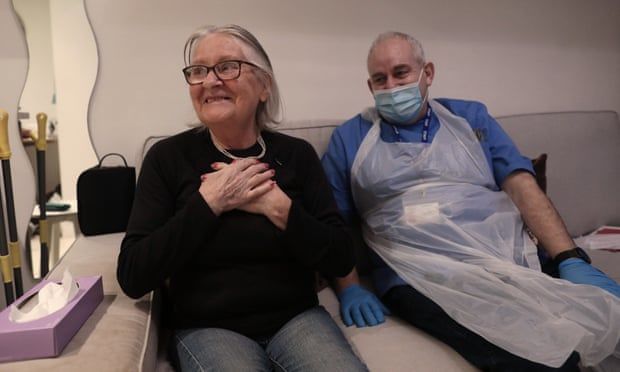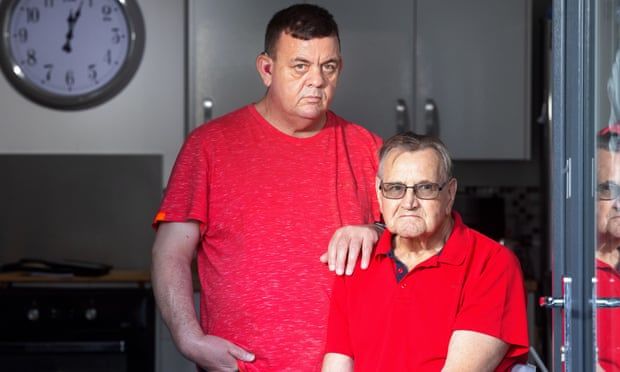
Homecare services crisis in England at worst point yet, say operators
Services that look after the elderly and disabled at home are facing the worst crisis in memory, operators have warned, with hours of unmet care in England increasing more than fivefold since May to 1.5m.
Vital visits to look after people with dementia and other disabilities are being denied amid rising demand – including families concerned about sending their loved ones to care homes during the pandemic – and staff shortages triggered by low pay and Brexit.
About half of domiciliary care providers are no longer able to take on new requests for help, according to the Homecare Association, and 85% of operators believe the situation is the hardest it has ever been. The charity Age UK has warned of the emergence of “care deserts”, a term more often applied to US healthcare shortages.
The crisis threatens the welfare of some of the country’s most vulnerable people and puts pressure on NHS beds, as people who could be cared for in the community end up in hospital. Families told the Guardian that people feel imprisoned if carers are not available to take them outside, while their health is harmed because they forget to eat, drink and take medicine properly and on time.
“Our strategy seems to be to neglect people in the community until they are in crisis, then blue-light them into hospital,” said Jane Towson, the chief executive of the Homecare Association. “Then it is the devil’s own job to get them out again because of a lack of capacity.”
The Association of Directors of Adult Social Services (Adass) found that in the three months to the end of April, 286,000 hours of home care could not be delivered. By the end of October that number stood at more than 1.5m hours. Councils have managed to increase the number of hours delivered by 20% over that period, but it has not been close to enough.
“These are not numbers. These are people’s lives,” said Stephen Chandler, the president of Adass. “Every single one is a person who is missing out on vital support that enables them to live their lives. The government must take immediate steps to ensure that everyone gets the care and support they need this winter.”
 Margaret McCann at home during a visit by care worker Trevor Thew.
Margaret McCann at home during a visit by care worker Trevor Thew.
Margaret McCann, an 81-year-old with dementia living alone in Brighton, is among those caught in the crisis. In June she stopped eating, and forgot to drink and take medication, and a crisis care team from Age UK stepped in temporarily until, her family hoped, a homecare package from the local council could be arranged. Six months later the only professional care she receives is from the crisis team, which was supposed to stop after six weeks.
“She has dementia and lives on her own, which is a massive worry,” said her daughter Sally McCann, who has a full-time job and a son aged 17. “She is basically on her own and is losing all her social contact. It breaks my heart. The emphasis is on keeping everyone at home, but they will just deteriorate unless there is help.”
On a short visit last week, Margaret, who remains spritely at times, held hands with her carer Trevor Thew and told him: “I’m nearly 82, you know.” “What’s your secret?” he asked. “I’ve forgotten,” she said. “I’ll tell you next time you come.”
Brighton and Hove city council said it has seen a fivefold increase in demand in the last year, with families increasingly reluctant to send loved ones into care homes. Brexit has hit providers’ attempts to find enough staff, it said.
“Social care services, including home care, desperately need more government funding quickly if we are going to continue to fully meet the needs of our residents,” said Sue Shanks, the chair of the council’s health and wellbeing board.
 Eric Griffiths and Charlie Pelham.
Eric Griffiths and Charlie Pelham.
In Salford, Charlie Pelham, 86, who is in a wheelchair after four spells in hospital this year, and Eric Griffiths, 57, who is registered deaf and blind, said they both need homecare packages but that these have either been unavailable or unsuitable, leaving them to fend for themselves.
“Imagine me being blind, pushing a wheelchair,” said Griffiths. “I was crashing into bus stops and tipping him out into the road because I couldn’t see what I was doing … I get Charlie ready, and I’m doing all the shopping by myself, doing all the cooking and the cleaning. It’s really hard. But what can you do; it’s got to be done.”
John Merry, of Salford city council, said: “There are challenges with the number of care workers. This is a national issue not unique to Salford, and we are working hard to bring in more service providers so there is enough resilience and capacity in care supply.”
In Leicestershire, Deirdre Thomas, 68, helps look after her mother, Jean, but has been looking for evening care for six months. “She is 99 and pretty wobbly,” she said. “My heart is in my mouth. I am so terrified she will fall over, an ambulance won’t come and I will never see her again.”
Urgent action is required “to even keep the system viable”, said Caroline Abrahams, the charity director of Age UK. “For older and disabled people the consequences of this crisis in care can be severe,” she said.
The Department of Health and Social Care said: “Care homes and homecare providers are benefiting from hundreds of millions of pounds of investment in the social care workforce, including through a dedicated recruitment and retention fund … Covid-19 pressures are continuously kept under review and the need for further support will be assessed as we go through the winter period.”










